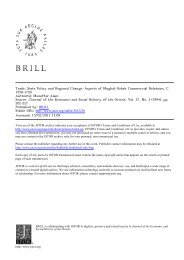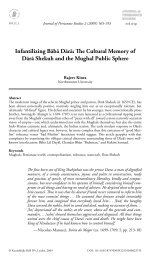The Mughals, the Sufi Shaikhs and the Formation of the Akbari ...
The Mughals, the Sufi Shaikhs and the Formation of the Akbari ...
The Mughals, the Sufi Shaikhs and the Formation of the Akbari ...
Create successful ePaper yourself
Turn your PDF publications into a flip-book with our unique Google optimized e-Paper software.
FORMATION OF THE AKBARI DISPENSATION 161<br />
in His grace has bestowed on me such power that if I wish I can, with a single letter, cause<br />
<strong>the</strong> Chinese emperor who claims divinity to ab<strong>and</strong>on his monarchy <strong>and</strong> come running over<br />
thorns to my threshold. But with all this power I await God’s comm<strong>and</strong>: whenever<br />
He wills, His comm<strong>and</strong> reaches me <strong>and</strong> is executed’. 75<br />
Later Naqshb<strong>and</strong>i Ahrari shaikhs, who had a strong memory <strong>of</strong> a<br />
share in power, would <strong>the</strong>n have found it difficult to adjust to a political<br />
environment where <strong>the</strong> king did far more than simply assert his sole<br />
authority. Akbar, for example, had <strong>the</strong> audacity to throw overboard<br />
<strong>the</strong> shaikh’s recommendation, <strong>and</strong> that too when it came from a scion<br />
<strong>of</strong> <strong>the</strong> great Naqshb<strong>and</strong>i lineage. Quite noticeably, <strong>the</strong>refore, Akbar<br />
moved away from <strong>the</strong> Naqshb<strong>and</strong>is. <strong>The</strong> emperor had lately begun<br />
to see <strong>the</strong> seeds <strong>of</strong> a formidable challenge to his plan for power <strong>and</strong><br />
political preeminence in <strong>the</strong> activities <strong>of</strong> several supporters <strong>of</strong> <strong>the</strong><br />
Naqshab<strong>and</strong>i lineage at <strong>the</strong> court <strong>of</strong> his half-bro<strong>the</strong>r Mirza Hakim,<br />
in Kabul. A glimmering <strong>of</strong> <strong>the</strong>se sentiments is evident from events in<br />
<strong>the</strong> 1580s. While his nobles <strong>and</strong> deputies were assigned <strong>the</strong> task <strong>of</strong><br />
suppressing serious rebellions. In Gujarat <strong>and</strong> <strong>the</strong> east, Akbar, himself,<br />
comm<strong>and</strong>ed <strong>the</strong> expedition to deal with Mirza Hakim in <strong>the</strong> Punjab. 76<br />
We will see below that Kabul served as <strong>the</strong> centre for relaunching<br />
<strong>the</strong> Naqshb<strong>and</strong>i order in India, even after <strong>the</strong> termination <strong>of</strong> Mirza<br />
Hakim’s regime.<br />
In <strong>the</strong> late 1570s Akbar had favoured <strong>the</strong> Chishti order. This is<br />
not to suggest that <strong>the</strong> Chishti saints’ concerns were purely spiritual,<br />
with no taste whatsoever for power <strong>and</strong> politics. <strong>The</strong>ir past too had<br />
seen cases <strong>of</strong> <strong>the</strong>ir conflict with rulers. 77 A significant feature <strong>of</strong> <strong>the</strong>ir<br />
politics had, however, been <strong>the</strong>ir support to rulers in <strong>the</strong>ir endeavour<br />
to adjust <strong>the</strong> nature <strong>of</strong> Muslim power to <strong>the</strong> Indian environment. 78<br />
Again, no Chishti shaikh ever amassed wealth comparable to that<br />
<strong>of</strong> Khwaja Ahrar, with a mission to reform a political regime, reward<br />
those who would listen to his exhortations <strong>and</strong> become submissive, <strong>and</strong><br />
punish <strong>the</strong> ones who dared act independently. On <strong>the</strong> contrary, <strong>the</strong><br />
75 Cited in Algar ‘<strong>The</strong> Naqshb<strong>and</strong>i order: A preliminary survey <strong>of</strong> its history <strong>and</strong><br />
significance’ in Studia Islamica, Vol.44 (1976), pp. 123–52. Emphasis mine.<br />
76 Subrahmanyam, ‘A note on <strong>the</strong> Kabul Kingdom’; Faruqui, ‘<strong>The</strong> Forgotten<br />
Prince’.<br />
77 Digby, ‘<strong>The</strong> <strong>Sufi</strong> Shaykh <strong>and</strong> <strong>the</strong> Sultan: A conflict <strong>of</strong> claims to authority’ in<br />
Iran, Vol.27 (1990), pp. 71–81; Sunil Kumar, ‘Assertions <strong>of</strong> authority: A study <strong>of</strong><br />
<strong>the</strong> discursive statements <strong>of</strong> two Sultans <strong>of</strong> Delhi’ in M. Alam, F.N. Delvoye <strong>and</strong> M.<br />
Gaborieau (eds.), <strong>The</strong> Making <strong>of</strong> Indo-Persian Culture: Indian <strong>and</strong> French Studies (Delhi:<br />
Manohar, 2000), pp. 37–65.<br />
78 For a discussion around this question, see Muzaffar Alam, <strong>The</strong> Languages <strong>of</strong> Political<br />
Islam: India 1200–1800 (New Delhi: Permanent Black, 2004), pp. 81–114.<br />
http://journals.cambridge.org Downloaded: 15 Feb 2011 IP address: 129.174.97.34






